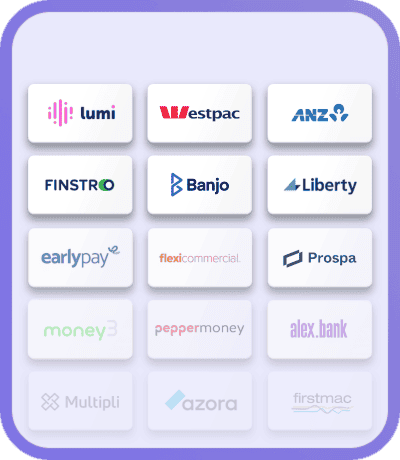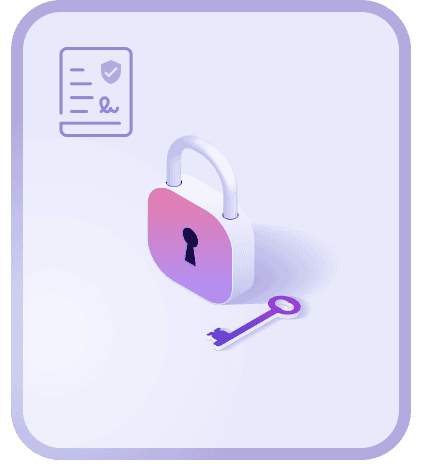Compare Loans To Buy a Business in Australia
Lend can help you get the best finance option for your next venture. It’s free to compare, with no credit score impact.
How Lend can help you finance a business purchase
Huge choice of lenders
We know which lenders specialise in business purchase finance and who will offer you the best deal.

Flexible options & support
Purchasing an existing business is a complex process – we’ll find you a finance structure with the flexibility you need. A Lend finance specialist will guide you on the process, your options and how to give yourself the best chance of approval.

Smart tech
We’ve built technology to make getting finance online faster and easier. No clunky processes or paperwork.

How to finance the purchase of an existing business in Australia
Buying an established business is generally seen as being less risky than starting from scratch. But it comes with higher upfront costs. A business loan is usually the best (and most common) way to finance the purchase of an existing business, but alternative finance options are also available.
Key points about raising finance to buy a business
- Many of the major banks are reluctant to lend for this purpose, but business finance brokers can access smaller specialist lenders who will
- A fixed-term loan is the most common type of finance to buy an existing business
- You may be asked to provide a deposit or security for the loan
- Lenders will consider both your current business financials (if you’re already a business owner) and the finances of the business you want to buy when assessing your loan application
Best finance options to buy a business
Loans to buy a business are available from banks, credit unions and non-bank lenders. That said, specialist non-bank business lenders are generally the best bet, as unless you are already a decent-sized business owner already, the major banks are typically reluctant to offer finance. Your main decision to amke will be whether to use a secured or unesecured loan.
Secured vs unsecured loans
Secured business loan
A secured business loan is the cheapest option for business acquisition finance. It generally involves using residential property as collateral for the loan in exchange for lower interest rates. Secured loans have longer terms of up to seven years.
A secured business loan is the cheapest option for business acquisition finance. It generally involves using residential property as collateral for the loan in exchange for lower interest rates. Secured loans have longer terms of up to seven years.
It can be a relatively easy way to increase your borrowing capacity, but it means your house is on the line if your business fails. It’s definitely not a decision you should make lightly, so be sure to discuss your options with your financial advisor.
Alternatively you may be able to use a business asset as security – either one owned by your current business or an asset owned by the business you’re acquiring. But generally, business lenders prefer residential assets as security.
Unsecured business loan
If you don’t have property you can (or want to) use as collateral, you may be able to get an unsecured business loan to help you get the funds to buy a business, but interest rates are generally higher since there’s no security on the loan.
If you don’t have property you can (or want to) use as collateral, you may be able to get an unsecured business loan to help you get the funds to buy a business, but interest rates are generally higher since there’s no security on the loan.
Unsecured business loans tend to be a short-term financing option, so you may only be able to borrow a portion of the purchase price with a loan term of up to three years.
If you already have some capital, an unsecured loan could be enough to bump your funds to what you need to acquire the business, or to boost your working capital during the takeover period.
What to consider when buying an existing business
While buying a business can be less risky than starting your own, it brings added complexity and many more moving parts. A business lender will want you to show you have done extensive research and due diligence before even considering your application for finance. Here’s what you should consider.
Get the business independently valued by an accountant or business broker to ensure it’s a worthwhile investment. This will give you a clear picture of the business’ current market value and its growth potential. Getting a valuation may also give you an advantage in the negotiation process and when deciding what you’re willing to pay for it.
Do your financial due diligence by examining the business finances from the past three to five years. You’ll need the help of an accountant or auditor in interpreting the financials. Lenders will specifically look for proof of profitability, cashflow, sales forecasts and future revenue projections.
Conduct some research on the business and the market it operates in. This will give you an idea of how well the business is positioned, its reputation and potential within that market. Here’s what your market research could involve:
- Find out how strong the demand is for the business’ products or services. What are the competitors doing? Are there any strong new competitors or disruptive alternative products coming onto the market? How will the business be able to leverage new technology like AI, or will it be disrupted by it? Is there likely to be a need for their services in the future? If not, what could you do to keep the business fresh and relevant?
- If it’s a retail business you’re buying, with a physical store, check out the foot traffic. Drop by on different days and at different times to see how busy it really is.
- Check out the closest competitors and see how their traffic and profits compare to the business you’re thinking of buying.
- Speak to the people at the heart of the business — the customers. Ask them what they like and what they don’t like. Do they use any of the competitors and if so, why? Will they still be willing to support the business if you take over? If they’re unsure, what would it take to secure their business?
- Chat to suppliers and find out whether the business pays on time. How does dealing with them compare to their competitors?
- Talk to some employees to find out what it’s like working for the company and how receptive they are to the idea of new management.
Use the Australian Securities and Investments Commission (ASIC) business name register to verify the seller's ownership of the business and that they have full rights to transfer ownership to you. Business partnerships and joint ventures will require all parties to agree to a sale agreement and that’s when things can get messy. Also, be aware of potential intellectual property rights held by other businesses.
Always confirm the seller's intent and enquire about their reasons for selling the business. Some key questions to ask include:
- Is the owner in a hurry to sell the business within a certain period? If so, they might be willing to accept a lower price if you can meet their timeline.
- Is money the prime motivation for selling or do they have to sell for specific reasons? If so, what are they? The owner could be ready to retire or switch careers. Or there could be other undisclosed reasons like competitors taking more market share or an expected downturn in the industry.
- How much of the company is the seller selling? The whole entity, or just some or all of the trading parts? Will the current owner maintain an interest in its ongoing success.
After you’ve checked valuation, financial due diligence, and market research off your list, you can think about making an offer if you still want to go ahead with the purchase. You’ll enter into negotiations with the seller, and once both parties have agreed on a price, you can proceed with a contract to legally seal the deal.
The contract will outline the final price, financial terms and conditions of the sale. Make sure there’s a provision that clearly confirms your legal ownership of all key assets and that states that all existing contracts with suppliers, leases and land titles are to be transferred to you. If you will be borrowing to finance the purchase, ensure your legal representative makes the contract conditional on your finance being approved.
Once you’ve signed the contract, you can lodge your application for transfer of the registered business name with ASIC. Don’t forget to transfer any relevant permits, licences, registrations and certificates. Check the Australian Business Licence and Information Service (ABLIS) to see which licences you need to transfer.
How to qualify for a loan to buy a business
Minimum eligibility requirements
- Australian citizenship or permanent residency
- An active ABN or ACN
- Sufficient regular revenue to repay the loan in full
- The ability to provide business bank statements and other financials (both for your current business and the one you’re buying
- Some lenders may require security
- A good credit score — the minimum credit score for business lending is around 400
Business financials
Lenders will want to see detailed financial information about your current business (if you have one) and the business you want to buy. You’ll be required to provide balance sheets, profit and loss (P&L) statements, and cashflow projections. Lenders will assess:
Assets...
It’s easier to get approved for finance if the business has assets, such as property, equipment and client contracts.
Liabilities...
Your borrowing capacity may be reduced if your business has outstanding debts or debts owing on secured assets.
Business revenue...
The business will need sufficient revenue to cover operating expenses and business loan repayments.
Business plan
You’re more likely to get approved for a loan if the business you intend to buy has a solid financial track record, as opposed to a business with a poor financial history which lenders would deem risky.
You will also have to demonstrate that you have enough experience and qualifications to manage the business you intend to buy. Write down a thorough business plan that details your business objectives and how you plan to achieve those goals.
Pros & cons of buying an existing business with a loan
Pros
• Easier to get finance
Lenders are generally more willing to fund a business purchase than a startup.
• Secured loan options
You may be able to use business assets or equipment as security to lower your interest rate.
• Proven revenue helps
An established business with stable income makes it easier to demonstrate loan serviceability.
Cons
• High financial risk
Taking on debt to buy a business can put your personal finances on the line.
• Costly due diligence
You'll need to invest time and money into legal, financial, and operational checks.
• Hidden problems
Even thorough due diligence might miss issues that emerge after the purchase.
More info about raising finance to buy a business
Alternative finance options
Investor or equity finance involves finding an investor (or multiple investors) willing to give you capital in exchange for equity stake in the business.The biggest advantage to this is that you won't start your career as a business owner with significant debts. If you find the right investor to be your business partner, you’ll also get the benefit of their business knowledge, resources and network of valuable contacts.
There are also disadvantages to equity finance like sharing ownership of the business with partners who may not share your same vision, but will expect a cut of the profits.
There are two types of investors — angel investors and venture capitalists.
- Angel investors: These are generally wealthy people who have experience in particular sectors or industries, and are keen to share their funds and their expertise.
- Venture capitalists: These are investment firms that usually have clear guidelines on the type of businesses they’re willing to invest in.
Peer-to-peer lending works like a marketplace that connects investors looking for opportunities to make a good return with people looking for a loan. There’s a number of platforms that match investors with entrepreneurs, with both sides getting a better deal because there’s no middleman or bank getting a cut.
Federal, state and local governments offer several grants to help develop existing businesses in regional areas or in priority industries like healthcare, advanced manufacturing, renewable energy, agriculture, etc. You can use the Business.gov.au site to search for grants available in your state, and program dates, and to check your eligibility.
FAQs
It depends on the value of the loan, the type of business you’re buying and whether the loan is secured or unsecured. If you’ve got property secured against the loan, you may not need a deposit. On the flip side, some lenders may require a deposit of up to 50% of the full loan amount if you don’t have security for the finance.
You can generally get better rates on a loan to buy an existing business if you have a good credit history or can provide collateral for the loan — usually property. Preferably both. Be sure to compare rates from different lenders before you settle on a loan product. Non-bank lenders can be more cost-effective as they have less overheads and more streamlined processes.
Buying a business can cost thousands or millions of dollars depending on the size of the business, its current market value, the asking price and other costs like financing fees, accounting fees, conveyancing fees, etc.
Yes, you can get a business loan to buy or set up a franchise. Just keep in mind that you'd be paying for the rights to trade under an established brand using its trademarks, products, suppliers and systems. You don’t have control over the direction of the business and you must meet your contractual obligations to the franchisor.